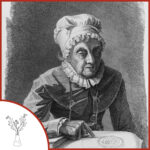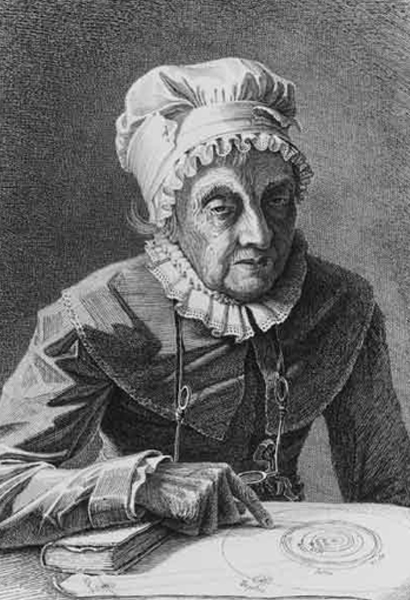

Birth: March 16, 1750
Death: January 9, 1848
Specialty: Astronomy
Major Contributions:
First professional female astronomer
Discovered 8 comets
Created a catalogue of nebulae
With an early childhood marred by disease, Caroline Hershel didn’t seem to have much of a future ahead of her. Her own mother decided that she was destined to be a spinster and would serve the family as a household servant. It wasn’t until one of her older brothers, William, had established himself as a musician in England that Caroline was given an opportunity to show the world what she was capable of.
First trained as a singer to accompany her brother she earned a reputation for her voice but refused to sing with other conductors. Soon, William’s interests turned to the night sky, and again Caroline was at his side. While he created his home telescopes, she ran the household and while he observed the sky, she took careful notes of his observations and findings. After he discovered the planet Uranus, King George appointed William as court astronomer and Caroline became the first professional female astronomer by being paid to be his assistant.
But it wasn’t just the work she did helping her brother that made her a pioneer in astronomy. Making her own observations of the sky lead to the independent discovery of the galaxy now designated Messier 110 and a total of eight comets. The first of those comets is called C/1786 P1 (Herschel) which she observed in 1786, the second designated 35P/Hershel-Rigollet she recorded in 1788. Between 1790 and 1795 she noted four more comets, and her final discovery was the comet C/1797 P1 observed in 1797. Working with her brother she discovered over 2,400 celestial objects over a twenty-year timespan.
After the death of her brother, Caroline continued to work in astronomy and created a catalog of nebulae to assist her nephew John Hershel in his astronomical work. Caroline was given many accolades including the Gold Medal of the Royal Astronomical Society and the Prussian Gold Medal for Science. She was named an honorary member of both the Royal Astronomical Society and the Royal Irish Academy.
Written by Angela Goad
Sources:
Biographies of Women Mathematicians: Caroline Herschel
The Comets of Caroline Herschel
Shooting Stars: Caroline Herschel
See Also:
NOVA Short | Founders of Astronomy | PBS (YouTube)
Wikipedia: 35P/Herschel-Rigollet
